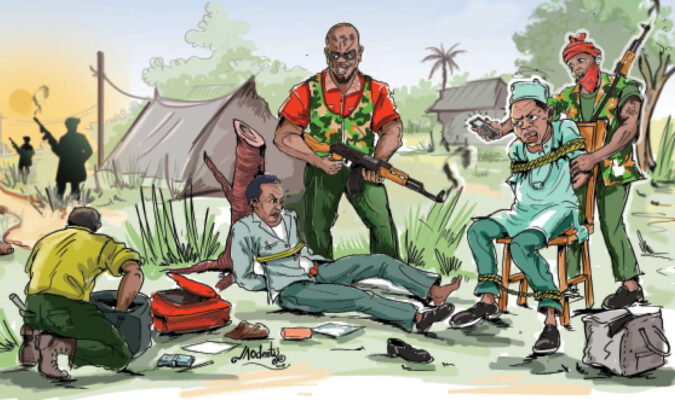The Centre for Crisis Communication (CCC) has advised the Federal Government of Nigeria to declare a state of emergency in order to fully tackle kidnapping and the perpetrators.
CCC Chairman, Major General Chris Olukolade (rtd), in a press release, expressed concern that the situation might degenerate into a major crisis if left unchecked as it endangers innocent lives and undermines national security.
The kidnapping epidemic, Olukolade noted, has evolved from sporadic criminal activity into a full-blown lucrative industry, with individuals and bandit/terrorist groups adopting it as a primary source of revenue in spite of security measures.
The organisation cited recent incidents such as the killing of a traditional ruler (Emir of Gobir) in the Sokoto emirate, the abduction of 20 medical students (now released) heading for Enugu, and the prolonged captivity of Dr. Ganiat Popoola, a medical doctor.
The CCC recommended a multi-faceted approach, including more investment in technology, addressing underlying socio-economic factors, as well as a national response comprising strengthened capacity, deepened synergy, and deep collaboration between federal, state, and local governments.
The statement titled “Declare State of Emergency on Escalating Kidnapping Crisis Now” reads: “Since the beginning of the year, Nigeria has witnessed a dramatic and disturbing series of abductions, with the Northwest becoming the epicenter.
“Just recently, the nation was jolted by the killing of a traditional ruler in Sokoto emirate who was earlier abducted on his way home by bandits. A few days before his eventual death in the hands of his captors, the monarch was seen in a video pleading for his life.
“It is saddening that despite the viral video that trended on social media, he was not rescued until he was savagely murdered by the kidnappers. It was only when the news of his death broke that government officials began to talk tough and issue directives.
“Equally saddening is the report that days after the death of the traditional ruler in the hands of merciless abductors, the bandits regrouped, stormed communities in the same axis and reportedly abducted about 150 people! Those folks are still in the hands of the bandits.”
The CCC said the story of the late Emir, his community, the medical students, and that of Dr Ganiat Popoola, who has spent about 8 months in captivity (doctors on a warning strike in protest) are sad depictions of worsening insecurity and unsatisfactory response at the three tiers of government.
“As of today, there are indeterminable number of hapless Nigerians in the hands and mercy of kidnappers in various forests and fortresses nationwide. Nigerians are no longer safe in their own country. They are not safe along the highways, in their streets, homes, schools, farms, churches, and mosques.
“The frequently reported cases of abductions on the highways and other locations are a clear indication that kidnapping has become a lucrative business model for criminal elements. More disturbing is the fact that kidnapping is being used as a distraction to mask other chains of criminality.
“These include illegal mining, organ harvesting, ritualism, cannibalism, skull mining, etc. For instance, it has been established from the account of freed victims that some kidnappers harvest and sell the organs of victims whose families could not afford to pay the ransom to ritualists.
“While commending the concerted efforts and ongoing joint operations of the security services, we hereby urge the Federal Government to adopt a multi-faceted approach to combat this odious kidnapping epidemic.
“First, we recommend significant investment in technology to enhance intelligence gathering and preempt kidnappings. This includes deploying advanced surveillance systems in high-risk areas and integrating tech solutions into the national security framework.
“Second, we suggest greater responsibility and accountability from the security forces. We suggest that henceforth, Divisional Police Officers (DPOs) and other Unit Commanders of security service should be held directly for incidences of kidnapping in their respective areas of responsibility
“This measure would incentivize local law enforcement to take proactive steps that will prevent such incidents, rather than merely reacting to them after the fact. Furthermore, security forces must justify the huge expenses by the government by producing visible results in their fight against insecurity.
“We again stress the importance of addressing the underlying socio-economic factors that contribute to kidnapping. This includes implementing economic empowerment programs in vulnerable communities, as well as improving access to education and healthcare to reduce the appeal of criminal activities.
“The CCC prescribes a coordinated national response. This involves not only strengthening the capacity of security agencies and deepening synergy between and among them but also fostering greater collaboration between federal, state, and local governments.
“The government should take a decisive action to reverse the current trend and restore peace and security across all regions. We, however, call on the international community to support Nigeria’s efforts to combat kidnapping and other violent crimes,” the statement concluded.

 Join Daily Trust WhatsApp Community For Quick Access To News and Happenings Around You.
Join Daily Trust WhatsApp Community For Quick Access To News and Happenings Around You.


